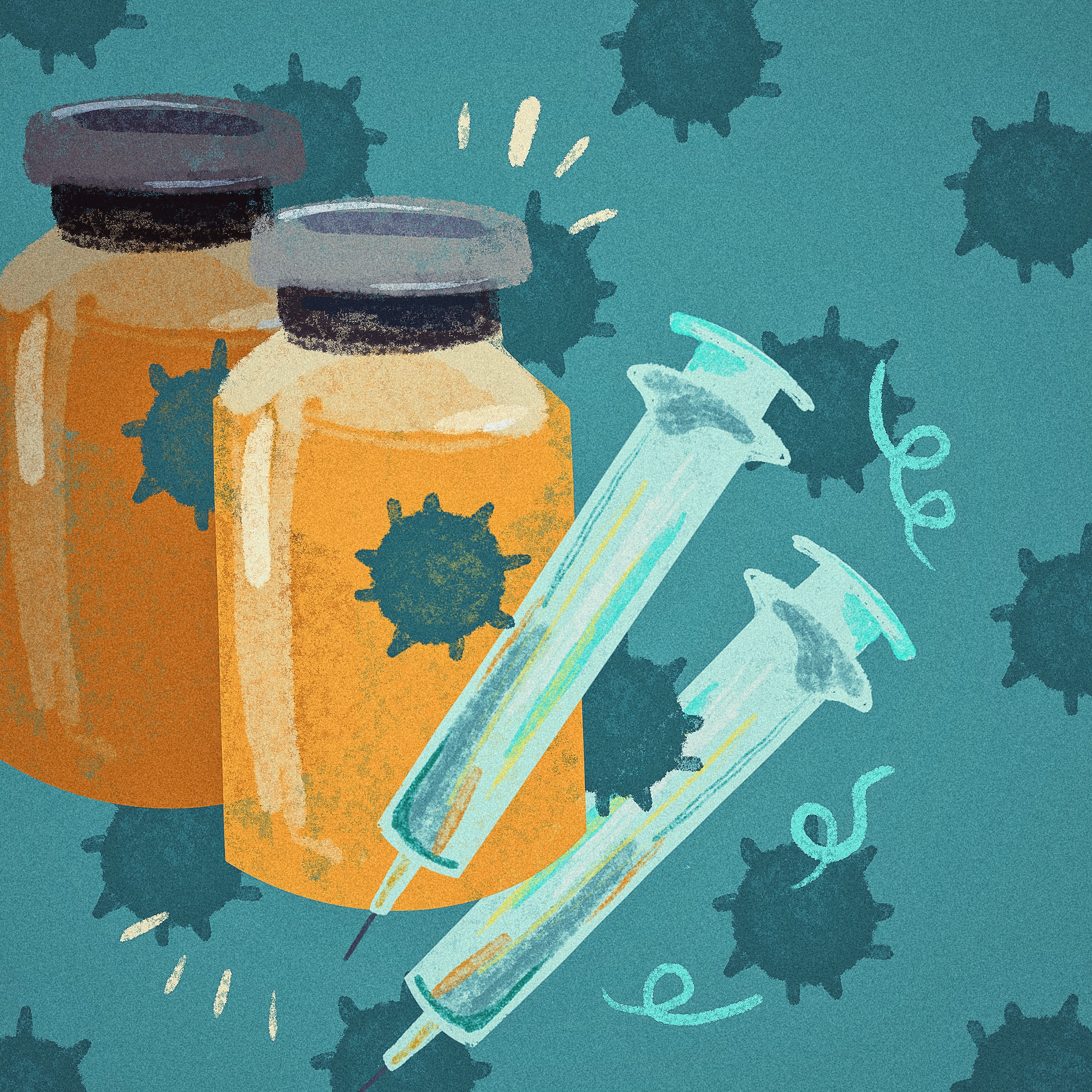
Sophia Zhao, Staff Illustrator
With the Johnson & Johnson single-dose COVID-19 vaccine pending FDA approval, epidemiologists are considering the effect that it will have on efforts to curb COVID-19 spread, as well as its implications for equity.
On Feb. 4, Janssen Biotech Inc., whose parent company is Johnson & Johnson, or J&J, submitted a request for Emergency Use Authorization from the FDA for the company’s COVID-19 vaccine — which appears to be 72 percent efficacious at preventing moderate to severe illness, according to initial data. The FDA’s Vaccines and Related Biological Products Advisory Committee will meet on Thursday, Feb. 26, to discuss and vote on whether or not to grant authorization for the use of J&J’s vaccine in the United States. Though this vaccine is a potential new tool in the COVID-19 arsenal to help fight the pandemic, its efficacy rate, which is lower than that of the Pfizer and Moderna vaccines, poses questions of equity: Who will receive the less efficacious vaccine? And who should receive it?
“Remember that even if the vaccine did not achieve the 94-95% efficacy of the Pfizer and Moderna mRNA vaccines, it still prevented severe disease,” professor of clinical epidemiology at the Yale School of Public Health Robert Hecht wrote in an email to the News. “Not a single vaccinated trial volunteer among the thousands who participated was hospitalized or died. That’s darned good.”
Hecht highlighted the fact that the J&J vaccine, if approved by the FDA, could pose unique benefits to the vaccine rollout compared to the Pfizer and Moderna vaccines. He explained that the J&J vaccine does not require refrigeration at subzero temperatures and is less expensive than the others. Because the J&J vaccine does not require this “cold chain storage,” it is an attractive candidate for other countries, where there are gaps in this type of infrastructure, he explained.
These qualities, Hecht says, will help make it “more affordable and versatile” as compared to the Pfizer and Moderna mRNA vaccines.
“Based on what I’ve read so far, I’m very bullish on the J&J vaccine,” Hecht wrote.
Yet the question remains: What matters more for the vaccine rollout, a vaccine that is more easily distributed or a vaccine that is more efficacious at preventing disease?
Yale School of Public Health professors A. David Paltiel and Jason Schwartz conducted a study at the School of Public Health in November to answer this question. The researchers created a mathematical model that analyzed the performance of various COVID-19 vaccines with different levels of effectiveness and distributional speeds.
“Our investigation preceded the news of the J&J vaccine’s efficacy,” Paltiel wrote in an email to the News. “Even before the J&J vaccine efficacy was announced, we wondered about single-dose vaccines and the choice between … protection in 5 weeks with a 95%-effective vaccine or protection in 2 weeks with an x%-effective vaccine. We asked, ‘What would x have to be?’”
Paltiel and Schwarz found that compared to a 95 percent effective two-dose vaccine, a single-shot that was 55 percent effective could prevent the same number of deaths due to COVID-19.
While this information was able to answer questions on the broader population level with regard to what matters more in preventing COVID-19 fatalities — efficacy versus efficiency in the vaccine rollout — the question of equity remains.
Albert Ko, chair of the Epidemiology Department at the School of Public Health, summarized the issue.
“The basic question … is individual levels of protection versus population and community level of protection,” Ko said. “OK, what’s the benefit to my family and community versus the benefit to myself. There’s certainly a psychological barrier or challenge. That’s where public health communication [is important].”
Ko acknowledged that although the lower efficacy of the J&J vaccine poses issues for an equitable vaccine rollout, more pressing are the benefits that this potential third COVID-19 vaccine could confer at the population level.
He echoed Hecht’s explanation that the more complex a vaccine program is, the more likely that it will result in failure. Thus, a single-dose vaccine like the J&J candidate will be vital in getting the job done.
“If you ask for my personal opinion, my hunch, getting a single dose of the vaccine will likely bring large benefits at the population level,” Ko said.
As of Feb. 21, the Centers for Disease Control and Prevention reports that 63,090,634 COVID-19 vaccines have been administered in the United States.
Sydney Gray | sydney.gray@yale.edu








